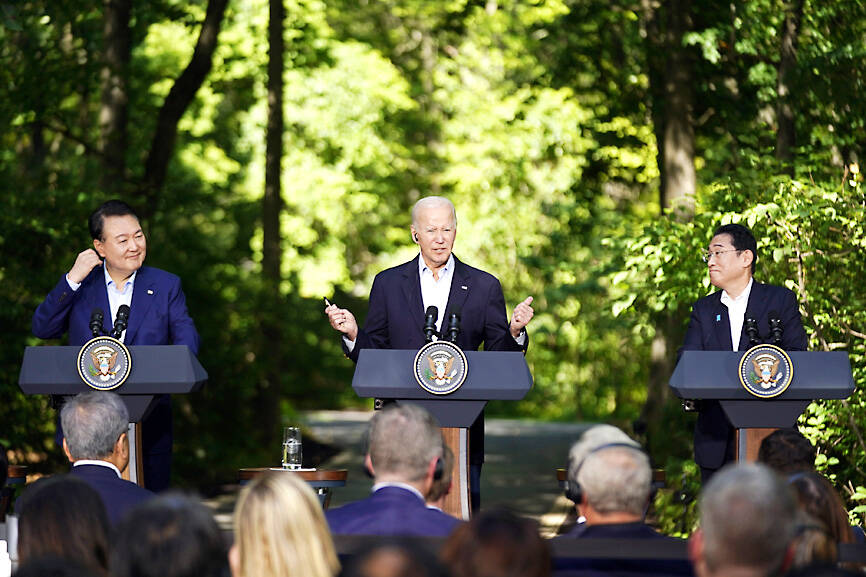The leaders of Japan, South Korea and the US on Friday reaffirmed their commitment to maintaining peace and stability across the Taiwan Strait following a historic summit at Camp David in Maryland.
“Today, we’ve reaffirmed — all reaffirmed our shared commitment to maintaining peace and stability in the Taiwan Strait,” US President Joe Biden told a news conference after meeting with Japanese Prime Minister Fumio Kishida and South Korean President Yoon Suk-yeol.
The first-ever standalone summit between Biden, Kishida and Yoon focused on expanding security, economic and technology ties between the three countries.

Photo: AP
The three countries agreed to engage in annual multi-domain military exercises, improve their information sharing and boost ballistic missile defense cooperation, Biden said.
He said they would establish a communications hotline to discuss responses to threats, while the leaders also agreed to share real-time data on North Korea and to hold summits every year.
“Our countries are stronger and the world will be safer as we stand together, and I know this is a belief that all three share,” Biden said, praising the “political courage” of Kishida and Yoon in turning the page on historical animosity.
Three documents were issued after the meeting: the Commitment to Consult, the Camp David Principles and the Spirit of Camp David.
“We reaffirm the importance of peace and stability across the Taiwan Strait as an indispensable element of security and prosperity in the international community,” the latter two state.
“Recognizing that there is no change in our basic positions on Taiwan, we call for a peaceful resolution of cross-Strait issues,” the Camp David Principles say, while the Spirit of Camp David reiterates the point.
In Taipei, the Ministry of Foreign Affairs in a news release yesterday thanked the three governments for expressing concern about the situation in the Taiwan Strait.
Taiwan remains committed to working with like-minded partners to foster peace, stability and prosperity within the region, it said.
“The purpose of our trilateral security cooperation is and will remain to promote and enhance peace and stability throughout the region,” Biden, Kishida and Yoon said in a joint statement.
Biden maintained, as have US, South Korean and Japanese officials, that the summit “was not about China,” but was focused on broader security issues.
Yet, the leaders in their concluding statement noted China’s “dangerous and aggressive” action in the South China Sea, and said they “strongly oppose any unilateral attempts to change the status quo in the waters of the Indo-Pacific.”
Yoon noted in particular the threat posed by North Korea, saying the three leaders had agreed to improve “our joint response capabilities to North Korea’s nuclear and missile threats, which have become sophisticated more than ever.”
He said as the three appeared before reporters that “today will be remembered as a historic day, where we established a firm institutional basis and commitments to the trilateral partnership.”
Japan’s Kishida said before the talks that “the fact that we, the three leaders, have got together in this way, I believe means that we are indeed making a new history as of today. The international community is at a turning point in history.”
The visitors spoke in their home languages, using translators.
Additional reporting by AFP

MAKING WAVES: China’s maritime militia could become a nontraditional threat in war, clogging up shipping lanes to prevent US or Japanese intervention, a report said About 1,900 Chinese ships flying flags of convenience and fishing vessels that participated in China’s military exercises around Taiwan last month and in January have been listed for monitoring, Coast Guard Administration (CGA) Deputy Director-General Hsieh Ching-chin (謝慶欽) said yesterday. Following amendments to the Commercial Port Act (商港法) and the Law of Ships (船舶法) last month, the CGA can designate possible berthing areas or deny ports of call for vessels suspected of loitering around areas where undersea cables can be accessed, Oceans Affairs Council Minister Kuan Bi-ling (管碧玲) said. The list of suspected ships, originally 300, had risen to about 1,900 as

DAREDEVIL: Honnold said it had always been a dream of his to climb Taipei 101, while a Netflix producer said the skyscraper was ‘a real icon of this country’ US climber Alex Honnold yesterday took on Taiwan’s tallest building, becoming the first person to scale Taipei 101 without a rope, harness or safety net. Hundreds of spectators gathered at the base of the 101-story skyscraper to watch Honnold, 40, embark on his daredevil feat, which was also broadcast live on Netflix. Dressed in a red T-shirt and yellow custom-made climbing shoes, Honnold swiftly moved up the southeast face of the glass and steel building. At one point, he stepped onto a platform midway up to wave down at fans and onlookers who were taking photos. People watching from inside

Japan’s strategic alliance with the US would collapse if Tokyo were to turn away from a conflict in Taiwan, Japanese Prime Minister Sanae Takaichi said yesterday, but distanced herself from previous comments that suggested a possible military response in such an event. Takaichi expressed her latest views on a nationally broadcast TV program late on Monday, where an opposition party leader criticized her for igniting tensions with China with the earlier remarks. Ties between Japan and China have sunk to the worst level in years after Takaichi said in November that a hypothetical Chinese attack on Taiwan could bring about a Japanese

The WHO ignored early COVID-19 warnings from Taiwan, US Deputy Secretary of Health and Human Services Jim O’Neill said on Friday, as part of justification for Washington withdrawing from the global health body. US Secretary of State Marco Rubio on Thursday said that the US was pulling out of the UN agency, as it failed to fulfill its responsibilities during the COVID-19 pandemic. The WHO “ignored early COVID warnings from Taiwan in 2019 by pretending Taiwan did not exist, O’Neill wrote on X on Friday, Taiwan time. “It ignored rigorous science and promoted lockdowns.” The US will “continue international coordination on infectious